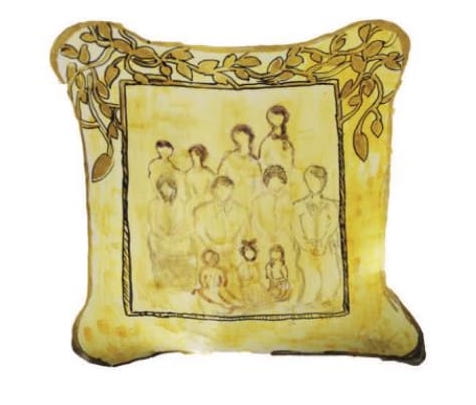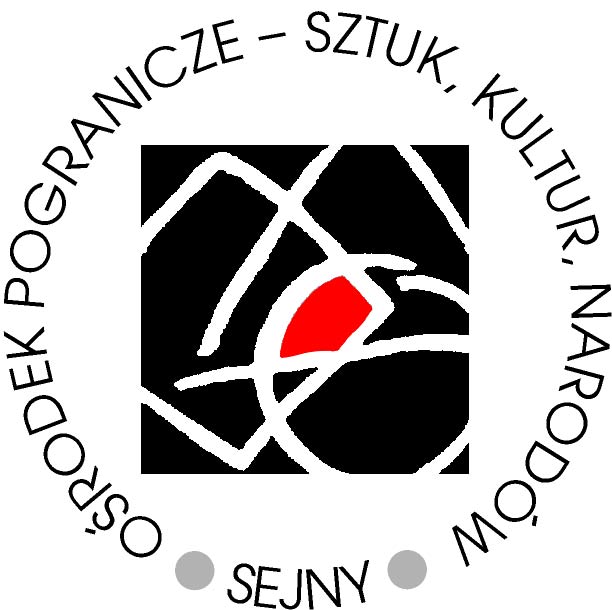Silva Rerum / Home Book

The Silva Rerum (Home Book) is composed of multi-generational, interdisciplinary activities bringing together inhabitants of four villages adjacent to the International Center for Dialogue: Krasnogruda, Dusznica, Żegary and Ogrodniki.
The project participants were a group of 30 of both young and older residents of the places. Drawing on the legacy of the historic silvae chronicles, they created a book-diary of the history of these towns and their families. The Silva of Krasnogruda is a tale of common life; it records major events – births, funerals, and notes and memories of persons who passed away. The chroniclers of the Silva of Krasnogruda explored old documents and photographs that bear witness to the past and in a meticulous way tell about the old days: the history of the region, patriotic events, times of war, shifts of borders, religious life, common neighbourhood fates of the living here Poles, Lithuanians or Old Believers. The project included also workshops which gathered mainly the young participants of the programme. These were workshops of journalism, film-making, photography, literature and art. The project was composed also of meetings and interviews as well as trips to the places where participants could have access to rich collections of films, photographs and documents recording the history of Poland and its culture. A very important element of these activities was a meeting within the creative work of different generations. The eldest shared their knowledge and experience, and the young drew on this knowledge by learning how to record and document a remembered past using film, photography and reportage. The project ended with a festive presentation of the Home Book, combined with an exhibition, screening of films and an evening of story-telling.
History of project activities
For many years, the Borderland Foundation has been conducting artistic and educational work in Krasnogruda, inviting and involving residents of neighbouring villages. Before 2011, i.e. before the International Center for Dialogue was established, the devastated and forgotten manor once belonging to the Miłosz family was a centre of many activities that tried to reinstate the manor within the fabric of the community life. The interiors of the manor, the park and the farm buildings of the former manor were recreated in detail thanks to the memories of the oldest inhabitants of the surrounding villages. Participating in these activities were young people gathered around Borderland’s artistic studios. This early stage marked the beginning of writing of the silvae of the manor and the surrounding villages, still without an awareness of a form for a comprehensively written Book.
Silva Chroniclers
The Chroniclers of the Silva of Krasnogruda have been both the older residents of the villages located near the manor, as well and their grandchildren. The work started with meetings on the most important places and events related to the history of the villages. There were 10 meetings:
- Żegary church, legends and memories passed on by family traditions
- Manor and its former, pre-war residents, documents, photographs, accounts, memories of the oldest
- The tragic fire of the wooden, historic church in Żegary and its rebuilding thanks to joint efforts of the villagers
- Home archives: documents, photographs and souvenirs
- About neighbours who have passed away this past year. Remembrance Day
- The history of the church in Żegary in diocesan documents
- A meeting with the historian, Rev. Adam Adukowski - History of the Church in Diocesan Documents
- Map of our villages
- Our houses and their stories
Chroniclers’ meetings marked the paths of documenting and developing the video and audio recordings. Thanks to them, the Silva Archive which collects and manages the material collected during the project by its participants was established. The archive contains also photographs documenting the course of the project, portraits of "Story-tellers", as well as archival photographs that complement the collected stories - interviews.
Trips
An important educational element, building the Silva Chroniclers’ community, were trips.
Trip One - Warsaw
During this two-day trip to Warsaw, the Silva Chroniclers visited the House of Meetings with History - an institution that deals with the history remembered and narrated from the perspective of an individual person. The participants got acquainted with the work of the Archives of Oral History and also for the first time had an opportunity to present their project - to talk about meetings, gathering of data, the beliefs that accompany their activities and how they create their "Home Book - Silva Rerum". Another place visited by the Chroniclers was the Jewish Historical Institute. The search for forms of remembrance and transposition of this message into the language of presentation in the space of the exhibition titled What We Were Unable to Shout Out to the World telling about the group of people active in the Warsaw Ghetto, documenting the extermination of Jews by the Nazi. A visit to the Royal Castle in the Archives of Historical Records and Documents gave the opportunity to get acquainted with the oldest monuments of printed books stored in the Castle Library. Visiting these several institutions which in various ways dealt with history, remembrance, and preservation of the past, provided an opportunity to observe the work on the history of the place in a wider perspective of cultural activities related to the preservation of tradition and remembrance of the past of their own villages.
Trip Two - Vilnius
The second journey of a similar character, this time to Vilnius, was taken by a group of young people involved in the project. Along the way, they visited the rebuilt from the ruins the Tyszkiewicz’s Castle in Zatrocze with an interesting interior reconstruction and a story about the life of the last owners of this place, and the nearby Trakai (a town with a rich history of the Karaim community).
In Vilnius, workshops were held at the Renovation Workshop of the University of Vilnius and in the Tolerance Center at the Vilna Gaon State Jewish Museum. The workshops included a presentation of the Silva Rerum project and the concept of the prepared exhibition. The participants also analysed the ways and possibilities of presenting historical material in the exhibition space (sound, light, display of bilingual materials).
Both trips became important activities in the implementation of the project. They presented various contexts of dealing with history, with the past, and at the same time showed various forms of presentation of content and methods of historical narration.
Workshops
The project was accompanied by educational and artistic workshops concerning film, photography and journalism. Each meeting consisted of two elements: lecture-presentation and practical action. The Photographic Workshop was run by Radosław Krupiński - lecturer at the Podlaskie School of Photography and Entrepreneurship. The conducted workshop was themed around portrait. The first workshop concerned the history of portraiture, the second the art of portrait. The Film Workshop was run by Beata Hyży - Czołpińska, an outstanding director of documentaries, who has been making films related to Podlasie for 20 years. The first workshop presented her film output and the story of her own adventure with film. The second workshop concerned the theme of "the hero" in the documentary and analysis of different approaches to the main character in a film. The journalist workshop was run by Izabella Kossakowska – radio journalist and reporter of Radio Bialystok. The first workshop concerned presentations of author's radio reportages. The second workshop was composed of journalistic exercises: on theme, interlocutor, art and asking questions. All workshops were aimed at introducing the tools that a Chronicler might use in his/her work of collecting materials.
“Silva Rerum” Exhibition
Part of the project activities were 30 meetings which took place in the homes of all participants of the project, as well as other local residents; as a result they gathered a collection of photographic documentation from the households of Krasnogruda, Dusznica, Żegary and Ogrodniki. Each house opened up with stories about the family, its inhabitants and the building itself. This is how the concept of the exhibition was born: a spatial map of several villages which are located along the axis connecting the manor in Krasnogruda and the church in Żegary. The exhibition in the space of the Krasnogruda manor house is divided into three elements: the space of story, the space of photography and the space of film.
The key element of the exhibition is the Open Book (sculpture) hand-made by artists invited from Ukraine: Vasyl Savchenko and Anastasia Lysyuk. The concept of the exhibition is based on the idea of producing in the visitors an impression of entering the interior of the Book, itself being also a map. We move along map marked with lakes, roads and small scale models of the project participants’ houses. We are surrounded by white walls with film stories, audio tales and stories to be read, and photographs. In the hall, just before entering the exhibition, you can see a photographic reportage from the course of the project and watch a documentary film. All "written materials" of the exhibition - the names of villages and lakes, residents, stories placed on the walls - are bilingual, given in Polish and Lithuanian. The inhabitants of the Krasnogruda villages are of Lithuanian origin and speak Lithuanian at home and in church.
The New Year’s Meeting
The summary of the project was the New Year's meeting titled “The Stories from the Past”. It was attended by the Silva Chroniclers, members of their families, also other residents of villages and artists taking part in the project. All participants agreed that they have just started their chronicle work - there are still many stories to be told, people worth mentioning, many documents and photos to be found. It was solemnly decided that the project would continue. The materials collected during the project became also a basis for an educational offer created for teachers and school groups. The offer will include lessons on the memory of family, home and places of birth, designed for various age groups based on the Book - Exhibition.








